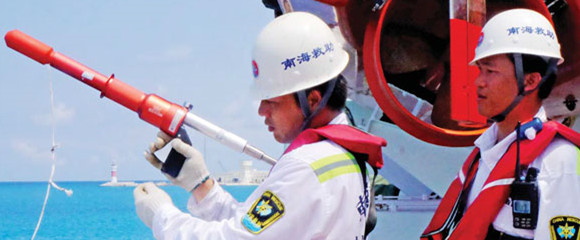Chinese law enforcement activities in its own territorial waters legitimate and justifiable
Updated: 2016-05-30 07:16
By Zhang Duo and Zhang Renping(China Daily)
|
|||||||||
UNCLOS prevails over the COLREGs.
For the purpose of collision avoidance, the Convention on the International Regulations for Preventing Collisions at Sea requires ships to keep well clear of each other as a matter of principle, which is contrary to law enforcement practice which often necessitates the approach of another vessel. So when a conflict arises between law enforcement activities as authorized by UNCLOS and actions required by the COLREGs, which shall prevail?
UNCLOS prevails. Adopted by the United Nations at its third Conference on the Law of the Sea, it has been widely accepted as the "Constitution for the oceans". From the perspective of jurisprudence, UNCLOS is legally superior to the COLREGs. Thus, in cases of conflict, the application of Article 25 (1) of UNCLOS, which authorizes Chinese law enforcement vessels to approach its Philippine counterparts as a necessary measure to prevent their prejudicial activities in Chinese territorial sea, takes precedence over the application of the COLREGs. Therefore, in respect of the incidents alleged by the Philippines, the Chinese law enforcement vessels did not violate the COLREGs, it was the Philippine vessels that violated UNCLOS by conducting activities other than innocent passage in China's s territorial sea.
Boyle and Allen put the horse before the cart by holding that the COLREGs prevails over UNCLOS and applies in all circumstances. The absurdity of this logic can be illustrated with the following scenario: Foreign vessels could wantonly trample on the sovereignty of a coastal State by entering its territorial sea and conducting activities prejudicial to its sovereignty. The only response the coastal State could make in order not to violate the COLREGs would be to order its law enforcement vessels to keep well clear of the intruding foreign vessels and not conduct any preventative activities. Such a situation is totally against the regulations and spirit of international law.
The two professors pointed fingers of blame at Chinese vessels for intentional, deliberate behavior that demonstrated a reckless disregard for the safety of Philippine vessels, but they chose to ignore the fact that the Chinese vessels involved are much faster than their Philippine counterparts, had those Chinese vessels intended to collide with the Philippine vessels, many collisions would have taken place. However, there was no collision. This is because the intention of the Chinese vessels was to drive the intruding Philippine vessels out of the Chinese territorial sea as authorized by Article 25(1) of UNCLOS, without any attempt to threaten the safety of the vessels and personnel on board.
The arbitration initiated by the Philippines is intended to defame China by confusing right and wrong.
The authors are professors at Dalian Maritime University.
Today's Top News
Rescue vessel eyed for the Nansha Islands
Steeled for change
EU has to cope with outcome of British referendum
Four Chinese banks among world's 10 largest
Kiev swaps Russian detainees for Ukraine's Savchenko
Refugees relocated during major police operation
China calls for concerted anti-terror efforts
London's financial centre warns of dangers of Brexit
Hot Topics
Lunar probe , China growth forecasts, Emission rules get tougher, China seen through 'colored lens', International board,
Editor's Picks

|

|

|

|

|

|







